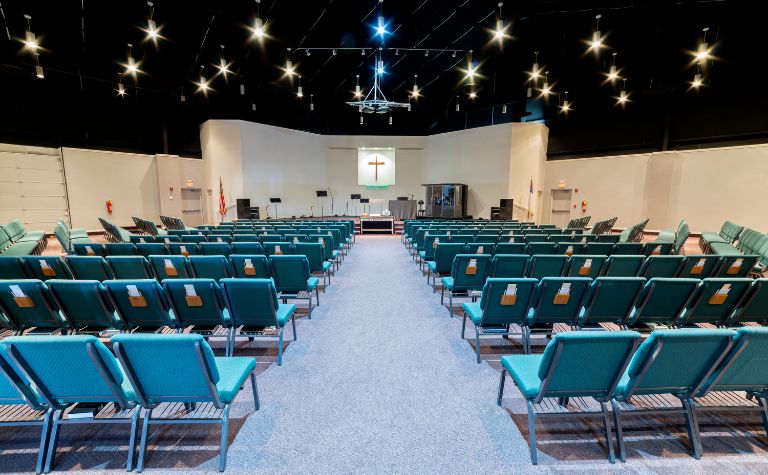The Assemblies of God, since its establishment over 100 years ago, has become one of the largest Protestant denominations in the world. It has the same core beliefs as other Christian traditions, yet it has unique convictions as well.
The Assemblies of God denomination doesn’t believe in eternal security, also known as the perseverance of the saints, when it’s defined as “once saved, always saved.” The denomination’s teaching, which reflects Arminian theology, states that it’s possible for a truly converted believer to lose their salvation.
Why doesn’t the Assemblies of God believe in eternal security? Can any Christian have an assurance of their salvation according to the denomination’s teaching? How does the Assemblies of God respond to Reformed teaching on eternal security? Keep reading to learn more.

Does the Bible Teach Eternal Security?
When a person converts to Christianity and decides to follow Jesus Christ, they often want assurance that their salvation won’t be lost. People sometimes wonder if God will take back his gift of salvation or if they could lose it through sin. (Also see Assemblies of God vs. Presbyterianism: What’s the Difference?)
The doctrine that addresses these concerns is traditionally called “perseverance of the saints” (“saints” in this context refers to any Christian), yet some traditions refer to it as “eternal security.”
Some people use the term “once saved, always saved,” but even those that argue in favor of the perseverance of the saints generally don’t prefer that term.
The Bible teaches about the assurance of salvation, but not all readers agree on how to interpret the verses. Verses on eternal security include:
- John 6:37, “All that the Father gives me will come to me, and whoever comes to me I will never cast out.” (ESV)
- John 10:28, “I give them eternal life, and they will never perish, and no one will snatch them out of my hand.” (ESV)
- Romans 11:29, “For the gifts and the calling of God are irrevocable.” (ESV)
- 2 Corinthians 1:22, “And who has also put his seal on us and given us his Spirit in our hearts as a guarantee.” (ESV)
Why Doesn’t Assemblies of God Believe In Eternal Security?
Can people lose this assurance? Is it a contradiction to lose something that is “assured”? The Assemblies of God observes that some people who convert to Christianity through repenting of sin and believing in Christ don’t remain devoted. (Also see Assemblies of God vs. Church of God: What’s the Difference?)
Instead, some exhibit a level of devotion temporarily but then abandon or renounce their commitment to obey God and live according to the Bible. Arminian theology argues that such a person may have been genuinely converted but lost their salvation.
Bible verses that are commonly cited to defend the idea that believers can lose their salvation include:
- 1 Timothy 4:1, “Now the Spirit expressly says that in later times some will depart from the faith by devoting themselves to deceitful spirits and teachings of demons.” (ESV)
- Hebrews 6:4-6, “For it is impossible, in the case of those who have once been enlightened, who have tasted the heavenly gift, and have shared in the Holy Spirit, and have tasted the goodness of the word of God and the powers of the age to come, and then have fallen away, to restore them again to repentance, since they are crucifying once again the Son of God to their own harm and holding him up to contempt.” (ESV)
- 2 Corinthians 11:3, “But I am afraid that as the serpent deceived Eve by his cunning, your thoughts will be led astray from a sincere and pure devotion to Christ.” (ESV)
How do other Christians understand this? For Reformed Christians, as well as for many Baptists, a person who had an external experience of conversion but never demonstrated a transformed life, or did only for a period of time, was never truly saved in the first place.
The person may have gone through the motions of repenting of sin and believing in Christ, but it was false. Evidence of genuine salvation, according to this view, is persevering in devotion and obedience. (Also see Assemblies of God vs. Non-Denominational: What’s the Difference?)

How Does the AG Respond to the Reformed Argument for Eternal Security?
The Assemblies of God happily acknowledges the common ground they have with other Christians, including those who hold to Reformed theology. The denomination states,
“It is important to recognize that both Reformed and Arminian groups, especially in their moderate expressions, are fully Christian. Holding a high view of Scripture, both affirm that humankind is in need of salvation, that God alone can provide salvation, and that Christ is God’s provision for our need. In fact, members of both groups are usually together in evangelism and discipleship, though differing on certain points of theology.” [1]
In 2015, the General Presbytery of the Assemblies of God adopted a position paper on Reformed theology, which in part addressed the rising popularity of the Calvinist belief system.
The paper is a response to the main tenets of Reformed theology and why the Assemblies of God disagrees with them. (Also see Assemblies of God vs. Lutheran: What’s the Difference?)
Does God force people into a relationship with him? The essence of their argument is that just as God doesn’t force people into a relationship with him, he also doesn’t force them to stay in one. God has given people the freedom to leave him if they choose, though they will suffer consequences, even eternal ones, as a result.
Therefore, God doesn’t jeopardize people’s eternal security, but an individual can jeopardize their own. The paper continues, The Assemblies of God does not accept the doctrine of “Eternal Security” and in particular the “once saved, always saved” extension of that teaching. [1]

As stated in the section above, many leading Reformed and Calvinist theologians and pastors dislike the phrase “once saved, always saved” because they don’t think it’s biblical or that it accurately reflects their beliefs. Nevertheless, the Assemblies of God’s position on eternal security is clear. (Also see Assemblies of God vs. Baptist: What’s the Difference?)
Does Reformed theology teach that a momentary decision results in legitimate salvation? Not necessarily. Reformed theology warns against the false assurance of salvation, such as when a person makes a momentary decision for Christ, like during an altar call, but never demonstrates the fruit of conversion, like obedience to God and moral transformation.
It’s also important to the Assemblies of God to clarify that faithful believers don’t have to live in constant fear that they are going to lose their salvation. They argue that Christians can be sure of their salvation in Christ,
“At the same time, ‘eternal insecurity’ (any idea that one must be saved over and over again, or is always at risk of losing their salvation) does not accord with Scripture or with Assemblies of God belief. The believer’s salvation is secure in Christ but can be abandoned by willful choice.” [1]
References:
[1] Source
[2] Source
[3] Source
Related Questions
The Assemblies of God and Baptist traditions are sizable and significant branches of Protestant Christianity. They each have a fascinating history in Europe, America, and as of the twenty-first...
The Assemblies of God is one of the largest Christian denominations in the world. Over 100 years after its birth, Assemblies of God churches are still growing. Yet similar to other denominations, not...
